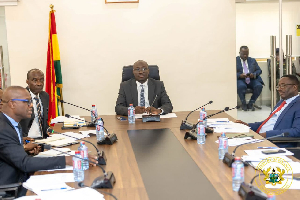Africa Business News of Sunday, 20 December 2020
Source: theeastafrican.co.ke
Kenyans to tighten belts further as mobile money charges return
The Central Bank of Kenya is reinstating charges on mobile money transactions, after they were put on hold to cushion Kenyans from the economic ravages of Covid-19.
In March, the banking regulator scrapped charges on mobile money transactions of up to Ksh1,000 ($9).
The charges will further reduce household incomes already facing the re-introduction of full income tax and VAT payments, effective January 1, 2021.
In a statement on Friday, the CBK said it has allowed payment service providers (PSPs) to propose pricing structures for mobile money transactions except for person-to-person transfers of up to Ksh100 ($0.9) to any customer and network.
However, there will be no charges for transfers between mobile money wallets and bank accounts, and the limits will remain.
On March 16, CBK increased the transaction limit for mobile money from Ksh70,000 ($636) to Ksh150,000 ($1,363), and increased the daily limit for mobile money transactions and mobile money wallet limit from Ksh140,000 ($1,272) to Ksh300,000 ($2,727),
Economic misery
The return of charges for mobile money transactions is adding on to the economic misery. In early December, the National Treasury abolished part of the government’s tax relief measures in a desperate move to save the ailing economy that is closing in on a Ksh9 trillion ($81.81 billion) debt ceiling.
National Treasury Cabinet Secretary Ukur Yatani said salaried employees would start paying full income tax at the rate of 30 percent effective January 1, 2021. The rate had been reduced to 25 percent from April 1, 2020.
Mr Yatani also reverted the corporate tax rate to 30 percent from 25 percent, and the VAT to 16 percent from 14 per cent.
Kenya’s risk of debt distress has increased from moderate to high as the government’s accumulation closes in on the Ksh9 trillion ($81.81 billion) ceiling, breaching several sustainability indicators and narrowing the space for additional borrowing.
CBK said the country’s risk of debt distress has been exacerbated by the impact of the Covid-19 pandemic.
Data from the National Treasury shows that by August the country’s public debt stood at Ksh7.06 trillion ($64.18 billion), accounting for 69.2 percent of GDP, compared with the East African Community convergence criteria of 50 percent.
The Sacco Societies Regulatory Authority has also been given the go-ahead to levy a charge on transfers between mobile money wallets and Sacco accounts, to facilitate the integration with the mobile money ecosystem.
The bank said it has reassessed the emergency measures with the objective of consolidating the gains made so far and also facilitate a transition towards sustainable growth of the mobile money ecosystem.
“Following consultations with Payment Service Providers, CBK will allow the emergency measures to expire on December 31, 2020, and PSPs will introduce revised pricing structures from January 1, 2021,” said CBK.
On March 16, the banking regulator announced emergency measures to facilitate increased use of mobile money transactions instead of cash.
The measures were intended to run until June 30, 2020, and were extended until December 31, 2020.
A significant increase of mobile money usage has been noted over the period the measures have been in place, with the monthly volume of person-to-person transactions increasing by 87 per cent between February and October 2020. Over this period, the volume of transactions below Ksh1,000 ($9.09) increased by 114 per cent, and 2.8 million additional customers are using mobile money.
Business-related transactions also recorded significant growth over the same period.
Entertainment











